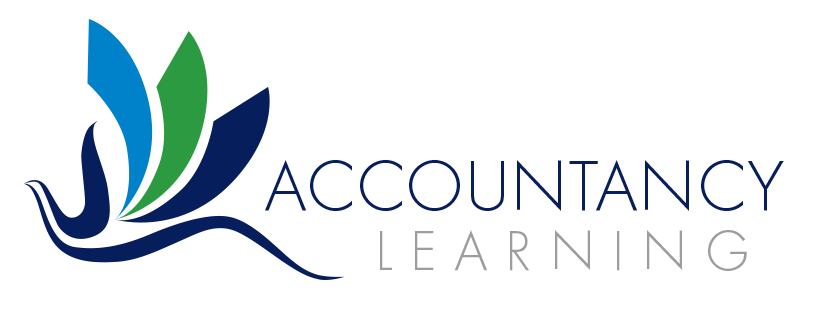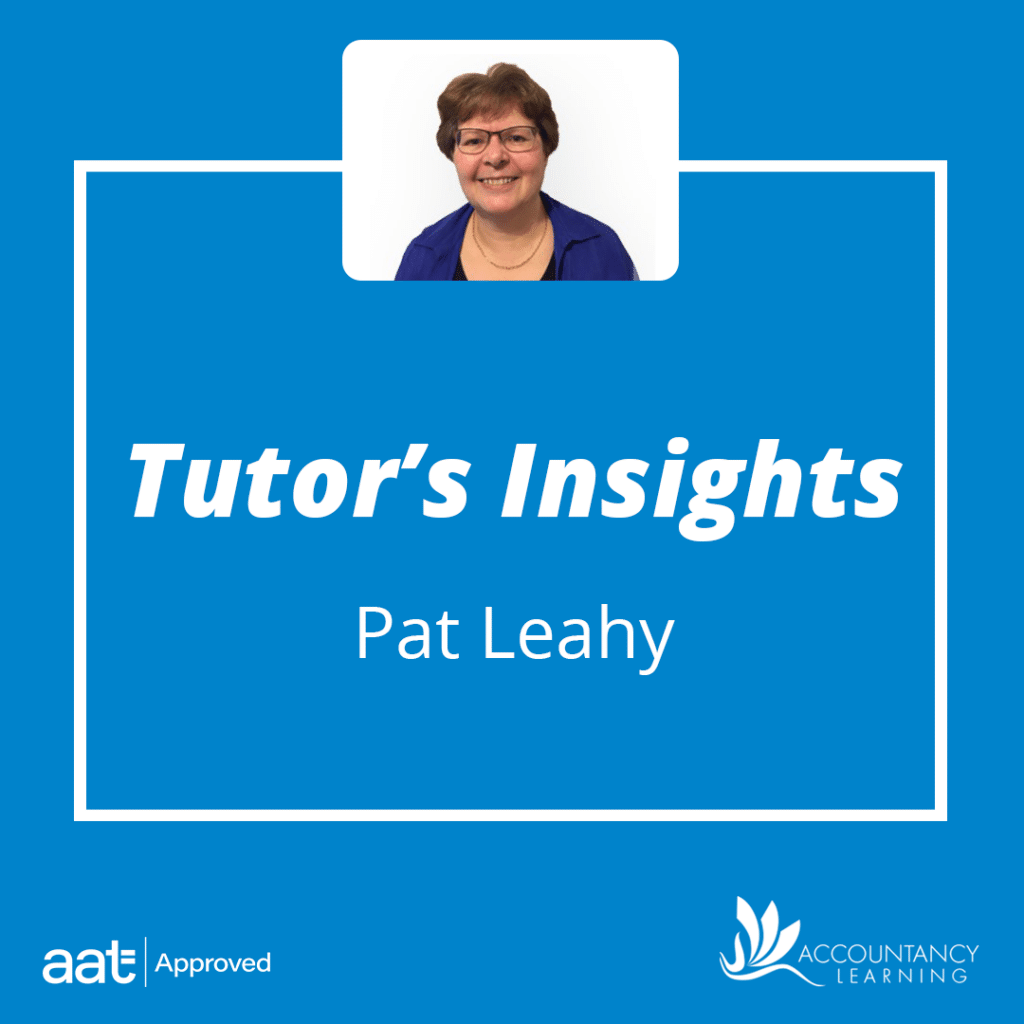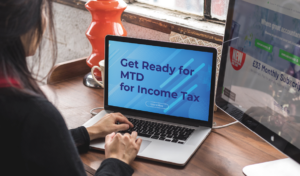Hello and welcome to something new!
This is a new blog series which aims to provide our AAT Tutor’s insights into various topics around their role at Accountancy Learning.
Think of it as a ‘behind-the-scenes’ moment for now. It also provides me with an opportunity to get to know our tutors better through mindful conversations and to provide you with more interesting content – we’re all winning!
First up, I spoke with Pat Leahy, AAT Tutor. She provided her expertise and perspective on the learning environment at Accountancy Learning.
For some background info on Pat, click this link: Pat Leahy – Accountancy Learning
Can you tell me about your role at Accountancy Learning?
I look after distance learning students and my job is to support those students through their studies. The obvious thing is to mark work, and I do mark work! There are prep tests that are mainly done on Moodle which I review and provide feedback for.
But there’s a lot more to it than that, students have queries and sometimes I will answer with an e-mail, sometimes it will be a phone call, or maybe a Teams meeting.
I think that the job is also about providing emotional support – distance learning is not an easy thing as you are very isolated and you haven’t got classmates to work with, and sometimes it’s that sort of emotional support that’s needed, just as much as the course support.
I try to make the relationship very personal in that that they know they’re dealing with a person, that’s one of the things that makes Accountancy Learning different from other places.
Why did you choose this industry?
I’m afraid it wasn’t a planned career and I fell into accountancy by chance, I struggled when I was doing my training – we are talking many, many years ago!
It did not come easily to me, and I failed quite a lot of exams which I think is helpful when you’re dealing with students who are also finding things difficult. After 15 years or so I just wasn’t happy, and I was looking for a change of role. I kept coming back to teaching, so I went back to university to be a history teacher but then massively struggled to secure a teaching role.
I’m a qualified history teacher but I’ve never actually taught history and after a long time (I applied for over 70 jobs to be a history teacher), I still didn’t get a single interview for a permanent post, because I was older, and I hadn’t followed a pattern that schools could understand.
But I then started applying for jobs to teach finance and that was where I really found my niche because I found that when I wasn’t doing my old job in finance, I loved being with all the finance stuff. It’s really very interesting! I like the management accounting side more than the financial accounting but because I’d struggled, I understood why students might also be struggling, which I found very helpful, and I just really enjoy it now.
There are so many different careers that you can have as an accountant, just qualifying as an accountant is the start. Accountancy Learning is only one aspect of education, for example, there’s college teaching, which I did for 20 years. So that’s two quite different careers!
What do you enjoy most about your role?
I think it would have to be helping people. This might sound a bit high flown, but you can change people’s lives. I’ve only consciously changed students’ lives once or twice during my career, but I think with this role, you can set people on a fulfilling career path.
I love that aspect and I really enjoy it when a student has said that they don’t understand something, and you explain it to them and they come back and they say that they get it, and then they pass their exam. It’s extremely rewarding and satisfying.
What should learners expect when studying an AAT course with Accountancy Learning?
I would say that a new learner shouldn’t expect it to be easy first of all, because as I mentioned, distance learning isn’t easy. They need to be disciplined about their studying and setting a routine. A timetable is really helpful, and I think that the only way you’re going to be successful in your studies is to integrate the studying into your everyday life so that it’s not just an add-on.
They are going to find interesting subjects with lots and lots of practise, because that’s the key to success in accountancy – practising techniques and lots of support!
We offer lots of support and if something is not quite right with the resources then you only have to tell us, and we’ll fix it. Of course, we don’t always get it right, but we do our best to ensure that the materials they have are comprehensive and correct. I think it’s good for learners to know that if they are thinking about self-studying, we ensure that our resources are as fully explained as they can be, because it can be more challenging without having any tutor support.
How does the learning environment differ from other training providers?
What I do know is that we provide a much more personalised learning experience than other learning providers and I think that’s also the case compared to a college, for example.
I used to teach in a college once a week meaning I would only have contact once. I don’t feel like I could give students my undivided attention but now I am able to provide unlimited tutor support for our students.
So, if a student wants to send you five emails a day, they can! You find that there are some students who ask for very little help and other students who ask for a lot of help, it’s just nice to know that there is one to one tailored support, as much as they need. And that does make us different from other training providers.
What advice would you give to new learners that are thinking about venturing into the industry?
I would say that you’ve got to feel comfortable working with numbers. The job isn’t all about numbers, but if you really don’t like the idea of it, then you’re going to find it tricky.
There are so many different career opportunities within the accountancy sector. I mean just working within a private accountancy firm. There’s tax, education, or charities – there’s so many different jobs that you can do.
If we think about the tutors here at Accountancy Learning, we’ve all come into this from completely different routes and that exemplifies the range of opportunities that there are, businesses are always going to need accountants.
Are there any exciting industry trends or news stories that have caught your eye recently?
I think this feeling of a move from a more analytical job role for the accountant is interesting and that is really the big thing now. You hear a lot of talk about big data and IT, and how the use of cloud accounting is changing the role of the accountant.
I think that an accountant needs to be somebody who can analyse, rather than just host numbers into an account. It’s interesting and scary as well, so I think that accountants are going to generally be more like business advisors in the future. It seems like there are lots of people who are not happy with using the cloud because of the security issues, but it’s not going away, and it does mean that things talk to each other.
I think that technology is changing and so the role must change to keep up with the technology and I suppose that’s another thing, that you just can’t sit back and rest on your laurels as an accountant. I don’t think you can in any job, but anybody who thinks that once you’ve learned to be an accountant, that’s the end to learning, is sadly mistaken because the job is changing the whole time and you must stay in touch.
I think a key characteristic that you need to go into this industry is adaptability. For example, double entry bookkeeping was invented in the 14th century and the basics have not changed, but the way we use it has changed out of all recognition.
Enrol with us today
If we have managed to convince you that the learning environment at Accountancy Learning is the right one for you, we have a range of course packages to choose from. Head here to browse: Courses – Accountancy Learning
Enrol now: Shop – Accountancy Learning
For any other questions, please get in touch with us, we are always happy to help.
Call us: 01392 435349
Email us: [email protected]
Message us: Facebook






